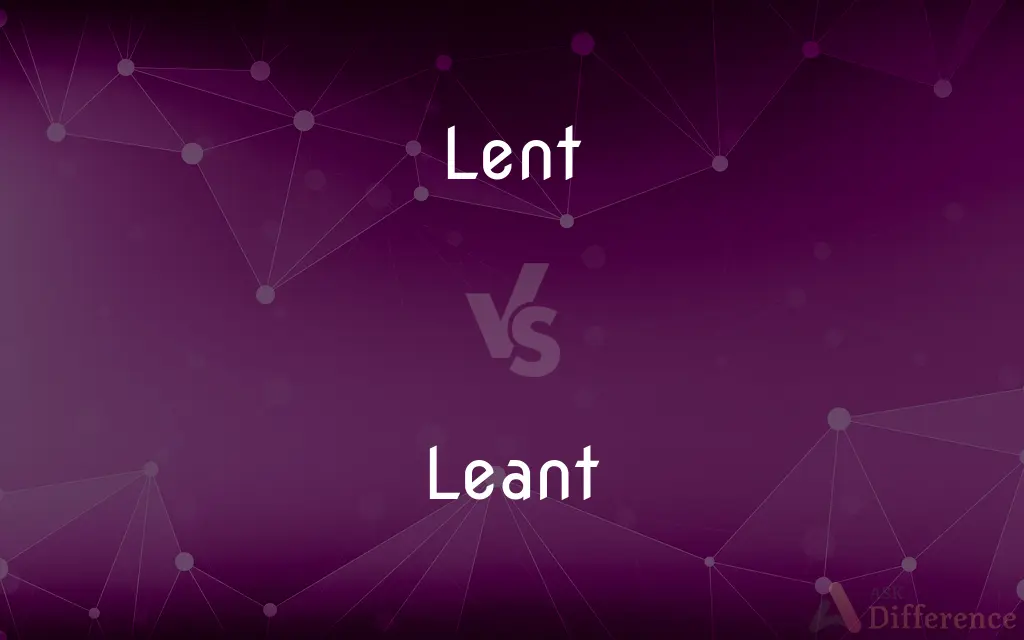Lent vs. Leant — What's the Difference?
By Maham Liaqat & Fiza Rafique — Updated on April 19, 2024
"Lent" is the past tense of "lend," referring to temporarily giving something to someone, while "leant" is a British form of the past tense of "lean," meaning to incline or rest against something.

Difference Between Lent and Leant
Table of Contents
ADVERTISEMENT
Key Differences
"Lent" is used when someone has allowed another person to use something temporarily without transferring ownership, whereas "leant" is used to describe someone or something that has inclined towards or rested upon another object for support.
"Lent" often implies a generosity or a helpful nature in social or financial contexts, whereas "leant" typically pertains to physical positions or attitudes, such as leaning against a wall or leaning towards an opinion.
While "lent" can be used in both financial and non-financial contexts (like lending a book or money), "leant" is primarily used in a physical or metaphorical sense (like leaning on a surface or a philosophical idea).
In usage, "lent" is a straightforward past action with no ongoing implications beyond the return of the item, while "leant" can describe both a past action and an ongoing state, such as someone who has leant on a railing and remains in that position.
The word "lent" is commonly used in religious contexts, particularly referring to the Christian season of Lent, which symbolizes the 40 days of fasting and penitence before Easter, whereas "leant" has no such religious or cultural connotations.
ADVERTISEMENT
Comparison Chart
Definition
Past tense of "lend"
British past tense of "lean"
Usage Context
Financial or social transactions
Physical or metaphorical support
Typical Associations
Generosity, assistance
Physical posture, support
Duration
Temporal (until item is returned)
Can be momentary or continuous
Cultural Connotation
Religious season in Christianity
None
Compare with Definitions
Lent
Can denote a broader sense of providing aid or support.
They lent their expertise to the community project.
Leant
Used to describe resting something on another object.
He leant his bike against the wall.
Lent
As the past tense of lend, used when something is given temporarily.
He lent his car to his brother for the weekend.
Leant
British past tense of lean, meaning to rest against.
She leant against the doorframe, watching the rain.
Lent
Often used in a financial context.
She lent them a significant amount of money to start their business.
Leant
Also used metaphorically to suggest support.
Politically, he leant towards progressive policies.
Lent
In a religious context, referring to the period before Easter.
She gave up chocolate for Lent.
Leant
Indicates both a completed action and a state.
The ladder has leant against the shed for years.
Lent
Used to describe an action completed in the past.
He had lent his books to the library by last year.
Leant
Can imply a tendency or inclination towards something.
He has always leant towards a minimalist lifestyle.
Lent
Lent (Latin: Quadragesima, 'Fortieth') is a religious observance in the Christian liturgical calendar that begins on Ash Wednesday and ends approximately six weeks later; depending on the Christian denomination and local custom, Lent concludes either on the evening of Maundy Thursday, or at sundown on Holy Saturday, when the Easter Vigil is celebrated. Regardless, Lenten practices are properly maintained until the evening of Holy Saturday.
Leant
A past tense and a past participle of lean1.
Lent
(in the Christian Church) the period preceding Easter, which is devoted to fasting, abstinence, and penitence in commemoration of Christ's fasting in the wilderness. In the Western Church it runs from Ash Wednesday to Holy Saturday, and so includes forty weekdays.
Leant
Simple past tense and past participle of lean
Lent
Past tense and past participle of lend.
Lent
A 40-day period of fasting and penitence observed by many Christians in preparation for Easter. In Western churches, Lent lasts from Ash Wednesday until Easter, usually excepting Sundays.
Lent
Simple past tense and past participle of lend
Lent
A fast of forty days, beginning with Ash Wednesday and continuing till Easter, observed by some Christian churches as commemorative of the fast of our Savior.
Lent
Slow; mild; gentle; as, lenter heats.
Lent
See Lento.
Lent
A period of 40 weekdays from Ash Wednesday to Holy Saturday
Common Curiosities
What does 'leant' typically describe?
It describes an object or person resting or inclining against something.
Is there a religious significance to 'lent'?
Yes, besides its general usage, it refers to the liturgical period of Lent in Christianity.
How are 'lent' and 'leant' different in terms of action?
"Lent" involves a transaction or generosity, while "leant" describes physical support or inclination.
What is the primary use of the term 'lent'?
It refers to the act of giving something on a temporary basis.
Can 'leant' be used in American English?
In American English, "leaned" is more commonly used instead of "leant".
Does 'leant' have any financial connotations?
No, 'leant' does not carry financial connotations; it is more about physical or metaphorical support.
What does 'lent' suggest about the lender's attitude?
It often suggests a helpful or generous attitude.
How does the context of use differ between 'lent' and 'leant'?
'Lent' is used in contexts of lending items or money, while 'leant' is used for physical positions or inclinations.
What does 'leant' convey about physical posture?
It often indicates leaning part of the body against a support.
Can 'lent' be used metaphorically?
Yes, it can be used metaphorically to denote offering any form of support.
Are there any synonyms for 'lent' and 'leant'?
Synonyms for 'lent' include 'loaned', 'advanced'; for 'leant', 'inclined', 'reclined'.
Can 'lent' imply a return of the item?
Yes, items that are lent are expected to be returned to the owner.
Can 'leant' indicate a permanent state?
While it usually describes a temporary state, it can imply a longer duration depending on the context.
What is the past tense of 'lean' in American English?
The past tense of 'lean' in American English is "leaned".
Is 'leant' used in formal writing?
Yes, but it is more commonly found in British English contexts.
Share Your Discovery

Previous Comparison
Fun vs. Joke
Next Comparison
Alcohol vs. VinegarAuthor Spotlight
Written by
Maham LiaqatCo-written by
Fiza RafiqueFiza Rafique is a skilled content writer at AskDifference.com, where she meticulously refines and enhances written pieces. Drawing from her vast editorial expertise, Fiza ensures clarity, accuracy, and precision in every article. Passionate about language, she continually seeks to elevate the quality of content for readers worldwide.















































